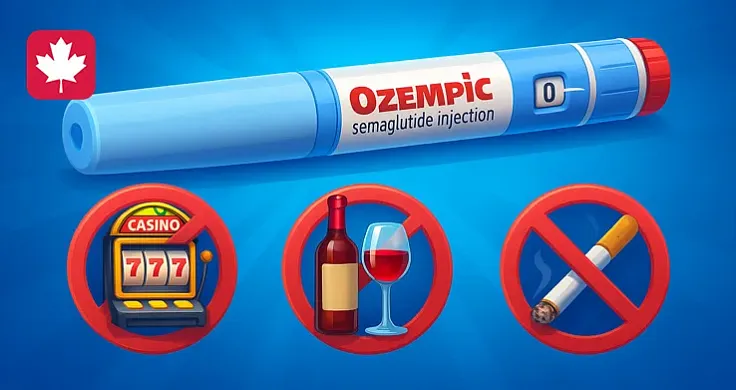
Ozempic reduces "cravings" – does it really help with gambling addiction?
In recent months, a lot of headlines have appeared around the GLP-1 class (semaglutide - the active ingredient in Ozempic/Wegovy): someone writes about a "cure for addictions", someone writes about the disappeared craving for alcohol, cigarettes or shopping. Let's sort out what large studies have really shown and what to rely on — and what so far remains only at the level of anecdotes and hypotheses.
What Big Data Showed
A team of researchers analyzed data from the U.S. Department of Veterans Database and compiled an association "atlas" for GLP-1 agonists. The authors compared GLP-1 users with patients taking other diabetes drugs and found that the use of GLP-1 agonists was associated with a reduced risk of a number of diseases and conditions, including substance use disorders. In their "cross-analysis", some of the outcomes (in total, about dozens of indicators) turned out to be statistically reduced; in one summary comparison, the authors note that approximately 13% of the outcomes studied showed a reduced risk with GLP-1. This is a large insurance/real cohort and an important signal, but not a direct clinical recommendation.
Why it doesn't mean that "Ozempic cures gambling addiction" right now
In these large registry analyses, disease codes (ICDs) are usually compared with the outcomes that are in the database – more often these are alcoholism, substance abuse, hospitalizations, etc. "Gambling addiction" (ludomania/gambling disorder) gets into the databases less often and is often less coded – therefore, there may not be direct, reliable figures for gambling addiction in a large registry study. That is, a large analysis showed a decrease in risks for a number of dependent outcomes in general, but there is less direct evidence for gambling addiction in it — there is still more indirect data and observations.
Linked materials
How the Hypothesis Works: The Brain and "Reward Reduction"
The mechanism that the researchers propose is related to the mesolimbic system — GLP-1 agonists, according to preclinical and early clinical work, reduce the release of dopamine in the reward system. Simpler: behaviors and substances that used to give a strong "high" become less "tasty" at the neurochemical level — and this can reduce cravings for food, alcohol, smoking, and possibly excitement. Scientists from Boston University and other centers comment on this effect in detail and note both encouraging observations and the need for trials.
Short randomized trials have already shown that semaglutide can reduce alcohol consumption and urges in people with alcohol use disorder (small in size, but RCT is an important sign). For example, clinical trials on semaglutide in people with AUD have yielded preliminary results in favor of reducing intake and cravings — this expands the biological logic, but it's still specific to alcohol and other substances. and not for gambling as a separate nosological unit.
The number "-13%" - where it comes from and how to read it
The figure reported in popular publications (about "13%") is worth reading carefully: in a large atlas in Nature Medicine, the authors report that when compared with some control groups, the proportion of reduced-risk outcomes was about 13% (that is, out of the hundreds of measures studied, some were found to have a statistically significant downward effect). This does not mean that all people have a 13% risk of a particular addiction – these are aggregated statistics for many outcomes. The simple interpretation "Ozempic reduces gambling addiction by 13%" is too simplistic and misleading.
What experts and real patients say
Experts from universities (including Boston University and clinicians at Stanford) note that there are many anecdotes and early data that patients are less drawn to alcohol, smoking, online shopping, and even gambling — but this is still a hypothesis that needs to be tested in targeted clinical control studies for each specific addiction. In addition, there are alarming signals about side effects and that "decreased pleasure" can also have negative consequences (anhedonia in some people).
Research is proceeding rapidly: targeted trials of GLP-1 for addiction to alcohol, nicotine, and other substances are now starting and continuing. Gambling addiction (ludomania) requires specific clinical trials — so far, the strongest base is observations, registration studies, and biological logic. If you follow the topic, focus on publications in leading journals and statements by regulators — and remember: one study is not a verdict or a panacea.




celese Haha, classic! First they screwed over the players, then the license turned out to be fake, and now they’re trying to undo everything. A total circus. Yeah, everything will just get bought. They’ll pay whoever they need in Curaçao and get a new license. Money rules everything, especially in this industry.



Mangarin4ik The section about how casinos fire VPNs is a gun. I've never thought about WebRTC and the time zone. Author, thank you, you may have just saved my next deposit.






































You need to be careful with the side effects of friends after weight loss, etc.
In short, if you want to be treated, go to a psychologist / narcologist. Pills are not magic, but part of an integrated approach.
Someone: "Ozempik saved my life." Someone says, "Then I got depressed." Real stories are different — don't believe only effect cases.
I do not recommend experimenting yet.
Works for me